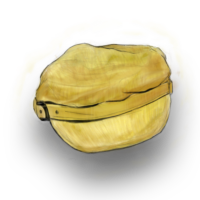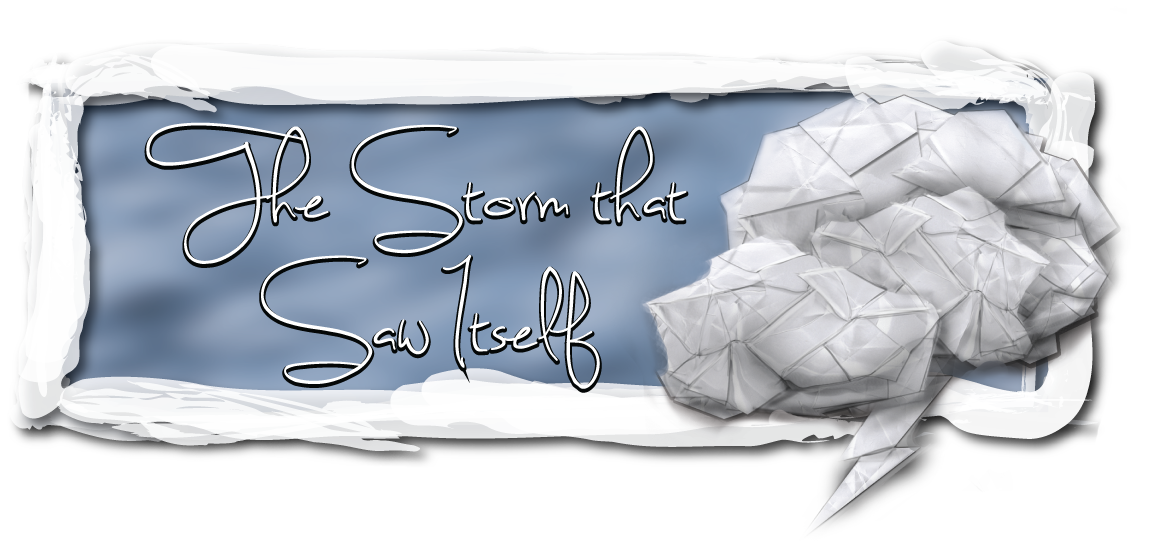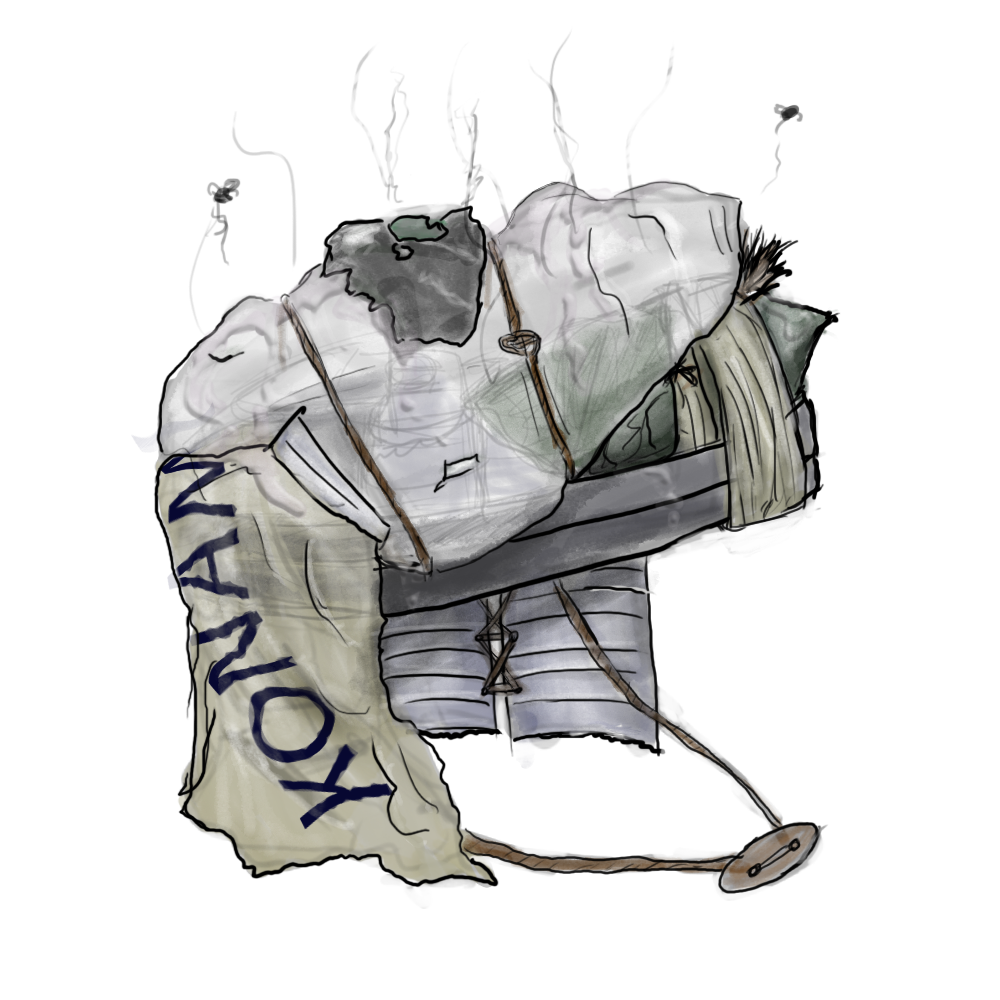– 7 –

Navvy Jim plays rock-paper-scissors against the mirror. It is a difficult opponent to beat. He has settled into a comfortable routine of playing rock — little reason to shift it up until he has a better handle on his opponent — but he has yet to do any better than a tie.
He’s almost seen it, though.
The mirror-Jim isn’t quite the same as Navvy Jim, after all. The mirror-Jim is flipped right to left. The mirror-Jim is seen whereas a navvier real Jim is; and, as the symmetry itself reveals, the two things are not and cannot be the same.
All he must do is exploit an opening, where the mirror-Jim is seen to throw rock, while Navvy Jim does throw paper — before, of course, the mirror-Jim does the same —
His eyes burn brightly.
He thinks his way into his mirror-self. He chases its horizontally-flipped thoughts. He begins to build a bridge of understanding to the self he sees himself as; begins to integrate it; begins to understand the patterns of the seen, and there is a rising glee in him as he starts to understand how to —
His mirror-eyes look up, startledly, as if seeing something behind him. A moment later, the real Jim sees it too; it distracts him; there is a semi-circle of the Lethal students in their yellow hats standing behind him in Eldri’s bathroom —
He cannot remember what it was that he was thinking. The glow in his eyes dims. His mirror-self, which he was certain was looking in a slightly different direction than his real self, is now reflecting him exactly in the glass.
Paper, and paper. A tie, again.
“Emily,” he says, plaintively, “I had almost beaten him.”
Emily tilts her head.
He sighs.
“A robot needs a little privacy,” he says. “Sometimes.”
He gestures around the bathroom.
Emily lifts an eyebrow.
He sighs.
“I am going to go recharge,” he says, with the stiff dignity of a rock-paper-scissors-playing robot, and he turns, and he walks away through them, and they disperse; they scatter like starlings and they are gone.
The summer is ending.
“Imagine,” says Navvy Jim, a few days later, “a perfect paper-playing robot.”
Emily leans back against the hillside. She imagines it. “Just how perfect?”
“Well,” he says, “it can’t beat scissors, of course.”
“I see.”
“But,” he says, and he holds out his hand, flat, swims it through the air, “it’s really good paper. It’s not, like, casual about it. It’s paper at the level of the divine. Paper that has shed all the detritus of scissors, of rock, of ambiguity in it and become something pure.”
“I can imagine!”
He is quiet for a while. Then he says, “You should not have your yellow, yellow hat, Emily, nor be in your yellow House.”
She licks her lips.
She stares up at blue sky and silvered clouds.
“They need me,” she says. After a while, she says, “Besides, we’re not really like paper. We’re more like . . . like dynamite.”
“Dynamite is illegitimate,” says Navvy Jim.
“Dynamite is awesome!” says Emily. “Dynamite blows up paper and rock!”
“I have played many games of rock-paper-scissors,” says Navvy Jim, modestly. “And I have never seen a game that was actually improved by the addition of dynamite.”
“You are an old fogey,” she says. She flicks him in the metal belly with a finger, producing a ringing sound. “You are just too conservative for dynamite, jaguar’s claw, hobbit-Spock-spider, and other innovative playing techniques.”
“I am so looking forward to being in my boxes again,” says Navvy Jim.
“Mean!”
He laughs.
“Fine,” he says. “OK. Dynamite, then. Why not? Three options are inefficient in any case. But even a perfect dynamite-playing robot would —”
He stops.
“What?”
“I am trying not to say ‘blow up,’” says Navvy Jim, “because my point requires me to say ‘lose to scissors.’ However, my humor subroutine is flinging my sensibilities around judo-style in my mind.”
Emily giggles.
After a while, he sighs.
“You do understand, though?”
She reaches for the sky, as if to pluck the moon.
“Yeah,” she says. “I get it.”
“A human,” he says. “Even a robot. A human can play all kinds of things. A human can grow. A human can learn. But I am afraid for you, in your yellow hat, because of the specificity of your perfection.”
“I’m afraid, too,” she says, softly.
“Then change,” he says.
“No,” she says. She sits up. She turns. She looks at him. She takes his hands. “I’m afraid, because you were going to break the world. You were, Navvy Jim. Not anyone else was.”
“That is an exaggeration,” he says.
“A perfect rock-paper-scissors-playing robot can’t exist, Navvy Jim. A mirror-beating rock-paper-scissors player — that can’t happen. You’re not part of the real world. You’re part of Gotterdammerung, part of the chaos Hans tried to tame. You’re some numinous interjection.”
“I’m not perfect,” he says.
“Have you ever lost?”
“I’m not perfect,” he says softly. “I’m just me. I just play rock-paper-scissors.”
“Hey,” she says. Her eyes are suddenly bright. “Hey. Hey. What’s the next move in your arm?”
“What?”
“I can prove it,” she says. “I can prove it. That you’re right. That everything’s OK. I can beat you. Just tell me what you’re going to throw next.”
“You can’t,” he says —
He’s shaking his head.
“Come on,” she says. She pokes him. She pokes him again.
“It’s paper,” he says. “But —”
“I can throw scissors?” she says. “I mean, if I go one two three scissors, bam, I win?”
“Yes,” he says. “But —”
“What?”
“You’re not that kind of player!” he says.
“What?”
“You’re not the kind of player who goes one-two-three scissors right now,” he says. “You know that.”
“You can’t know that!”
“I can totally know that,” he says. “Just look at your hat.”
“Just . . . my hat has nothing to do with this!”
Emily takes off her railroad cap. She hugs it to her chest. She hides it behind her back. It’s too stressful! She’s not wearing a yellow hat! She puts it back on and pulls it down over her eyes.
“It’s me, then,” she says. “I mean, it’s paper for throwing against me, right?”
“Yes,” says Navvy Jim.
“Let’s not even get into how you knew that when you programmed it,” Emily says.
“There’s an analyzable sequence of players,” says Navvy Jim, “with detectable features —”
“Let’s. Not. Get. Into. It.”
“But science,” says Navvy Jim, “is the art of taking a data stream, representing it in binary form, and analyzing it, producing observations either probabilistic or hypothetical about future bits to come —”
“Jim,” says Emily, sternly.
“What?”
“Are you seriously trying to distract me from playing rock-paper-scissors?”
Navvy Jim subsides.
“You,” she says. “Distracting me. From playing rock-paper-scissors?”
“I just so rarely get the opportunity to explain any of this stuff to anybody,” says Navvy Jim. “Most people just laugh, say, ‘Navvy Jim, you’ve won again!’ and wander off to drink svart-drink and putter about among their machines.”
“That is your overly cursory social experience,” Emily informs him.
“I also visited a nursing home!”
“Don’t give people at a nursing home svart-drink,” Emily says. “That’s very bad, Navvy Jim.”
“It’s got Pepsi blood! It gives them joie de vivre!”
Emily shakes her head. She fixes him with her golden gaze. She is calm. She is calm like a snake on morphine. The snake is also a master of Zen. It sways back and forth — or does it?
That snake doesn’t even exist!
Navvy Jim sighs.
“Very well,” he says.
He lifts his arm. They shake their fists at one another. One, two —
Emily pauses the game there. She says, “Paper, right? You’re sure?”
“I’m certain, Emily.”
“Even though I intend to play scissors?”
“You intend to play scissors,” says Navvy Jim. “You really do. But you are straightened in yourself, Emily. You are made one thing: one being, purified, all the scattered impulses of you brought down to a single form. When the time comes you will throw rock, because you love me.”
“Because I love you?”
He shrugs.
“I played through this conversation a thousand times in my head,” he says, “and a thousand more, and never found the path where —”
He looks stricken.
“I wanted to find a path where you’d be free of all this,” he says. “But I couldn’t. All I could find was this. All I could find was a way to end it with something beautiful.”
They count again. One. Two —
“Emily,” says Navvy Jim.
She’s waving a hand at him frantically. “Wait, wait, wait,” she says. “Like, if I play scissors, I’m ugly and I don’t love you? What kind of freaky robo-blackmail is that?”
“It’s not —”
He stands up. He flails his hands. He stomps around on the hillside.
“It’s not blackmail!” he says. “Look! I won’t even look! I’ll face the other direction.”
“You’ve wormed your words into my head!”
“Emily,” he says, “I won’t think the less of you for throwing scissors. I won’t think you don’t love me. I’ll just think that you’re willing to use scissors to cut the paper of my hand. That’s all.”
“That’s not love!”
“That’s not not love,” says Navvy Jim. “I can’t believe this. I can’t believe that I have to spend my last day not in boxes stomping around on a hillside explaining to someone that it is all right for scissors to cut paper.”
“Scissors don’t love paper,” says Emily.
“That is not the point,” says Navvy Jim. “Also, maybe they do.”
“What?”
“Nobody has ever asked the scissors how they feel about such things.”
“They are of two minds,” giggles Emily, suddenly.
“They —”
Navvy Jim hesitates a long moment. Then he says, “Oh.”
“It’s really OK?” Emily says.
“Would it be all right if you weren’t Emily?” he says. “And I weren’t Navvy Jim? If blue wasn’t blue and the sun were not the sun? Emily, you are a rock-throwing player. If you throw scissors that is more than all right; that is . . . unprecedented. That is heroic. That is . . . the world . . . it would be a terrifying miracle. It would sunder me. I would fall to my knees and laugh because the world is so very much bigger than I had ever dreamed. I would cry robot tears and I would laugh and suddenly everything would be big and bright and beautiful and unknown again, I would be a child again, and it would be more than just all right.”
“But not as good as taking my hat off,” Emily says.
“I’m sorry,” says Navvy Jim. “I just don’t like it. I think you can be more.”
“More than a girl who’s fighting Gotterdammerung,” she says. “Every single day.”
“Yeah.”
“I distracted Tom from detonating the quantum foam the other day,” Emily says.
Navvy Jim shrugs. “I wore a pair of sunglasses and played rock-paper-scissors with the mirror.”
“These are some seriously fulfilling lives,” Emily says.
“Absolutely.”
So she counts it off. He turns around like he’s said. She counts it off, one, two, three. But she isn’t strong enough. She can’t make herself do it. It isn’t in her.
“I’m so sorry,” she says, staring in confusion, in vague incomprehension, at her hand.
“Rock tears through paper?” he suggests.
“It’s just,” she says.
“Rock weighs paper down,” he offers.
“It’s just,” she says. “It’s just, I didn’t want everything to change.”
“No,” he says.
“I don’t like things being the same, Navvy Jim,” she says, and he’s turned around now, and he’s smiling at her, but with only half his mouth. She says: “I don’t like things being the same. But I was too scared. I didn’t want everything to change.”
“Emily,” he says. He takes and squeezes her hand. “Emily, you weren’t afraid of things changing. You were afraid for me.”
“I was so,” she says. “I was so. I was afraid for things. I was afraid of everything.”
Now she is crying and she doesn’t even know why. Now he is brushing her tears from her, touching her arm and shoulder, walking back with her towards Eldri’s home with her hand in his as if she hasn’t grown at all.
And sometimes I wonder if she’s alive today because, somehow, somehow because of that battle; if he’d charted all the paths, all the futures, or at least all three of them, and the world we got was the best one he could find. Sometimes I wonder if this was all he could do, the best Navvy Jim himself could do: getting her through to the day she decides to call the jaguars down.
“Sometimes I think,” he says, “what would it be like to be a hobbit-Spock-spider-playing robot?
“Sometimes I think,” he says, “wouldn’t that make everybody happier?”
But it wouldn’t.
That’s what Emily says. That it wouldn’t.
“It wouldn’t be you, Navvy Jim,” says Emily. “It wouldn’t be you.”
And they stay up very late that night, drinking hot cocoa and toasting marshmallows and telling stories, and then they power him down and they box him up and they put Navvy Jim away, until the world should have a place in it for rock-paper-scissors-playing robots once again.
And later, she goes back to school, and she votes at the club meeting.
There’s a patch, you see. There’s a new patch for the Thunder Dance.
There doesn’t have to be a Dynamite, any more.


